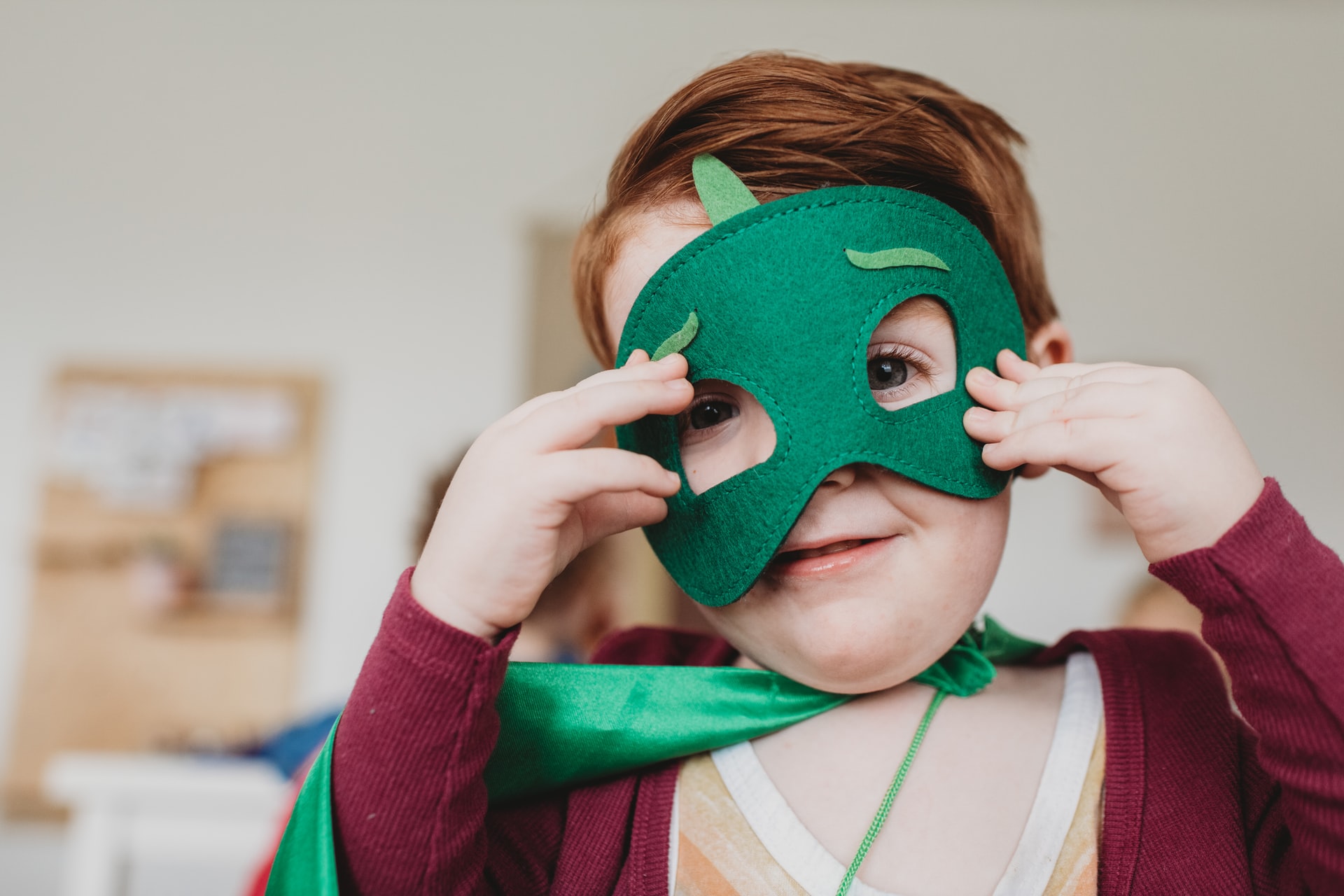As a parent, watching your children suffer is one of the worst forms of heartache. Whether it is the common cold, a bump on the head, or deep issues of growing up and navigating the world, parents want to soothe the sickness and relieve the pain. When your child struggles with bad dreams and anxiety, you will feel stress creep into your own life.
4 Ways to Help Children with Anxiety and Nightmares
Here are four ideas you can implement to help your child deal with the challenges in his life, including anxiety and nightmares.
1. Create an evening routine
 A good night’s sleep is important to a healthy body and brain function. Whether your child struggles with bad dreams or just has a hard time falling asleep because of worrisome thoughts, good sleep has become elusive. If your child’s sleep is interrupted, then your sleep is also being disturbed, and everyone will be crankier when it’s time to get up for the day.
A good night’s sleep is important to a healthy body and brain function. Whether your child struggles with bad dreams or just has a hard time falling asleep because of worrisome thoughts, good sleep has become elusive. If your child’s sleep is interrupted, then your sleep is also being disturbed, and everyone will be crankier when it’s time to get up for the day.
It’s hard to be woken up from the middle of a deep sleep, and you may not always respond well. If it happens every night the odds of you dealing with it graciously greatly diminish. Even dealing with separation anxiety in the daylight can be easier if you are both well-rested.
Consider what your family may need in the way of preparing for the day ahead. Do you have to be up at a certain time to get out of the door? Count back to what time your child should be in bed and sleeping. If your child needs to be at school by 8:30 am, they should be up at around 7 am, which means for a full night’s sleep of at least ten hours, they should be in bed by 9 pm. Now that you have an idea of when your child should be in bed, you can plan your evening.
Around 8 pm you have everyone (mom and dad included) shut off screens, which studies say greatly hinder everyone’s sleep habits. Focus on quiet activities, such as a card game or board game. Read picture books or chapters from a book. Read aloud while your child plays with Legos or does a puzzle.
Have your child put on comfortable pajamas, brush their teeth, and then have some cuddle time together. Creating a relaxing and comforting environment before the child goes to bed is reassuring for the anxious child.
2. Listen to the fear
 Children do not have rational fears, they have emotional ones. Their reactions will be emotional, and sometimes their bad dreams can be indicative of the big things they are afraid of. Rather than just trying to soothe away the bad dreams with things like, “It’s okay,” or “Nothing is here.” Listen to what your child is telling you. Ask questions, and get them to talk about the dream. Let them have a chance to work through their feelings themselves.
Children do not have rational fears, they have emotional ones. Their reactions will be emotional, and sometimes their bad dreams can be indicative of the big things they are afraid of. Rather than just trying to soothe away the bad dreams with things like, “It’s okay,” or “Nothing is here.” Listen to what your child is telling you. Ask questions, and get them to talk about the dream. Let them have a chance to work through their feelings themselves.
You as the parent may keep a dream journal and notice if bad dreams coincide with tests at school, or with certain foods at dinner time. Pay attention to their triggers, and focus on the places where you can relieve the fear outside of the actual nightmares.
With adults as well as with children, the thing they say they are upset about may not actually be the thing they are upset about. A child might be throwing a fit about having to wear a blue shirt, but maybe the last time they spilled on it, and someone laughed, so they don’t want to wear a blue shirt. They may not be able to follow the reasoning, just the emotional attachment.
Trying to soothe away a fear too quickly can result in a child feeling misunderstood. Be gracious and give both of you time and space to work through your child’s fears and anxieties.
 Anxiety in children may manifest in misbehavior. As a parent, you take time to observe your child and notice when a behavior becomes a pattern. Maybe your child is refusing to brush their teeth because a dentist made an offhand remark. Perhaps they overheard a news clip and now have a fear of germs.
Anxiety in children may manifest in misbehavior. As a parent, you take time to observe your child and notice when a behavior becomes a pattern. Maybe your child is refusing to brush their teeth because a dentist made an offhand remark. Perhaps they overheard a news clip and now have a fear of germs.
Children will fixate on things and think about them in ways that adult logic can quickly overcome. Your child is not an adult, and they don’t have full reasoning skills yet. They will fill in information gaps with made-up stuff all the time. Learn how to ask questions, and find out what they may be making up in their own minds.
“Where did you hear that monsters live under the bed? Tell me about what you are seeing. What can I do to help make this better? Is there something you don’t like about going to _____?”
Good questions open the doors to compassion and better ways of dealing with the cause of anxious behavior.
3. Offer physical and spiritual comfort
Have you ever tried to tell someone who is freaking out to just calm down? And has it ever worked?
When a child has a bad dream or they are melting down in the school parking lot, being bigger and louder is only going to make the situation worse. Take a moment to slow your breathing, hold your child and encourage them to breathe with you.
Rub their back, stroke their arm or head, whatever ways you can physically draw them in. Anxiety puts your body into fight or flight mode, so even before you can deal with the root problem, you need to put the physical body at ease. This will make it possible to find the problem and produce a solution.
Once the freaking out has stopped, and you have made the nightmare seem silly, then you can bring in the spiritual comfort. Pray with your child. You could memorize a prayer and say the same one together, or you could just pray for the child. Prayer for a good night’s sleep could be the last thing you do before tucking your child in and turning on the night light. Perhaps memorize a couple of key verses, such as
When I am afraid, I will put my trust in You. – Psalm 56:3
…even the darkness is not dark to You, but night shines like the day, for the darkness is as light to You. – Psalm 139:12
Give your child a firm faith in God’s ability to care for him, even when he is feeling most afraid. Reassure your child of your love by cuddling and quiet sympathy, reinforce that God loves your child with the words of Scripture and tell him that God will always listen to whatever he fears.
4. Maintain a healthy household
 As your child grows and changes so may their fears and anxieties. It could come from outside the home, from internal pressures on themselves, or places that seem illogical. You cannot possibly protect your child from everything. Do the best you can by providing healthy food, encouraging lots of time playing outside, and being present for them when they express their fears and stresses.
As your child grows and changes so may their fears and anxieties. It could come from outside the home, from internal pressures on themselves, or places that seem illogical. You cannot possibly protect your child from everything. Do the best you can by providing healthy food, encouraging lots of time playing outside, and being present for them when they express their fears and stresses.
Home may not always be a stress-free zone, but you can make it a place where they are safe to feel their emotions and work through them. When they can come to you in the middle of the night with their nightmares, or cry in the kitchen over the weight of the world, you know that you have created a place where they feel safe and loved.
Christian Counseling for Children
If you need additional support helping your child overcome anxiety and/or nightmares, please don’t hesitate to contact me or one of the other counselors listed in the online counselor directory.
“The Gardner”, Courtesy of Jonathan Borba, Unsplash.com, CC0 License; “Parachute Game”, Courtesy of Artem Kniaz, Unsplash.com, CC0 License; “Superhero”, Courtesy of Jessica Rockowitz, Unsplash.com, CC0 License; “Peace Out”, Courtesy of Larm Rmah, Unsplash.com, CC0 License






